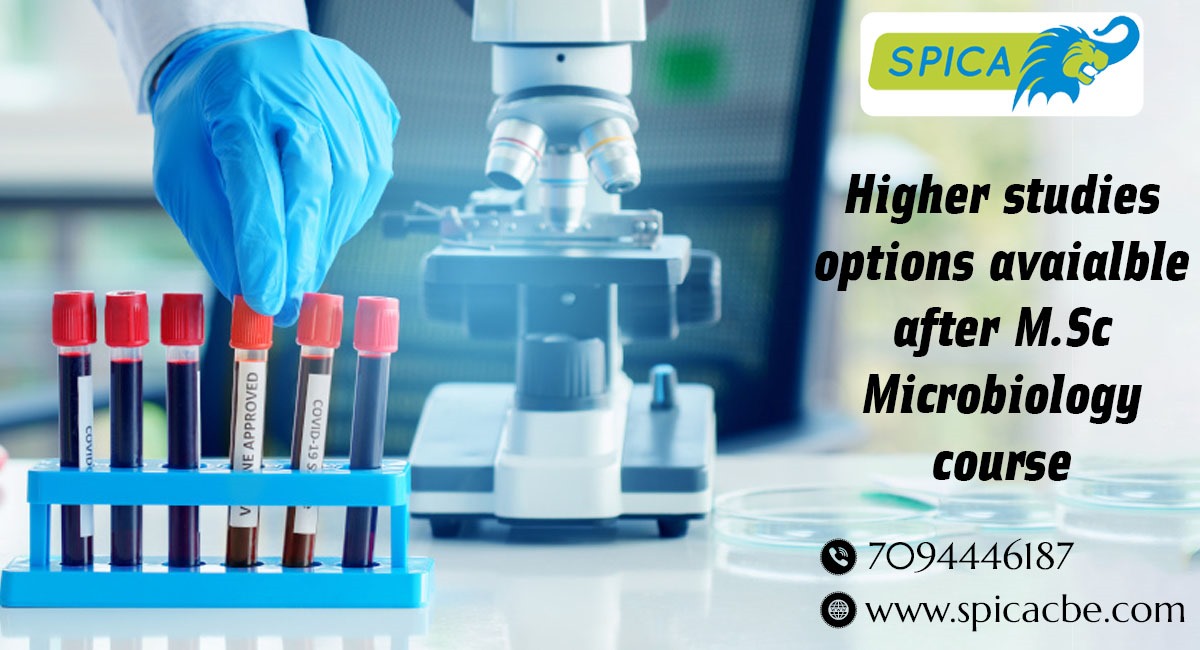
After completing an M.Sc in Microbiology, graduates have a plethora of higher study options to further specialize in their field, enhance their skills, and broaden their career prospects. Here are some popular higher studies options available after an M.Sc in Microbiology:
Higher study after M.Sc Microbiology:
Pursuing a doctoral degree allows individuals to conduct in-depth research, contribute to the field’s knowledge, and potentially enter academia or research-based roles in industries, research institutions, or governmental organizations.
Doctor of Medicine (M.D.) or Master of Surgery (M.S.):
Graduates interested in medical applications of microbiology can opt for postgraduate medical courses such as M.D. or M.S. in Microbiology. These programs are available in medical colleges and hospitals and offer advanced clinical and research training.
Doctor of Philosophy (Ph.D.) in Biotechnology:
Biotechnology and microbiology often overlap. Pursuing a Ph.D. in Biotechnology allows graduates to explore interdisciplinary research opportunities, especially in areas like genetic engineering, molecular biology, and bioinformatics.
Master of Business Administration (MBA) in Biotechnology Management:
An MBA with a specialization in Biotechnology Management equips graduates with managerial and business skills, preparing them for leadership roles in biotech companies, research organizations, and regulatory bodies.
Postgraduate Diploma Courses:
Various institutes offer postgraduate diploma programs in specialized areas of microbiology, such as Clinical Microbiology, Industrial Microbiology, Food Microbiology, or Medical Microbiology. These programs provide focused knowledge in specific fields of microbiology.
Certificate Courses in Laboratory Techniques:
Graduates can opt for certificate courses focusing on advanced laboratory techniques and methodologies. These courses enhance practical skills and are particularly useful for individuals seeking roles in clinical or research laboratories.
Professional Certifications:
Certifications from recognized professional bodies, such as the American Society for Microbiology (ASM) or the Society for General Microbiology, can validate expertise and enhance career prospects.
Research Fellowships and Postdoctoral Studies:
After completing Ph.D. or doctoral studies, individuals can engage in postdoctoral research fellowships, collaborating with renowned researchers and institutions to deepen their expertise and contribute to ongoing scientific projects.
Teaching and Academic Positions:
Graduates interested in teaching can pursue B.Ed. (Bachelor of Education) and M.Ed. (Master of Education) degrees to qualify for positions in schools and colleges. Additionally, the National Eligibility Test (NET) in Microbiology enables individuals to apply for teaching positions in colleges and universities in India.
International Collaborative Programs:
Many universities offer collaborative international programs, allowing students to pursue joint degrees or spend a semester abroad, gaining exposure to different educational systems and research methodologies.
Choosing the right higher education path depends on individual career goals and interests. Whether focusing on advanced research, clinical applications, management, or teaching, further studies provide avenues for specialization and professional growth in the field of microbiology.
Contact SPICA to enroll for online education degrees in the best-reputed university. This is the leading institute for online education in Coimbatore. All the study materials, E-materials, ID cards, Syllabus, Hall tickets, and Exam Time tables will be provided by us. You will get the proper guidance from the start till finishing your online education degree without any difficulties in between.
For More Details:
Contact: 7094446187
Mail: info@spicacbe.com
Visit: www.spicacbe.com




